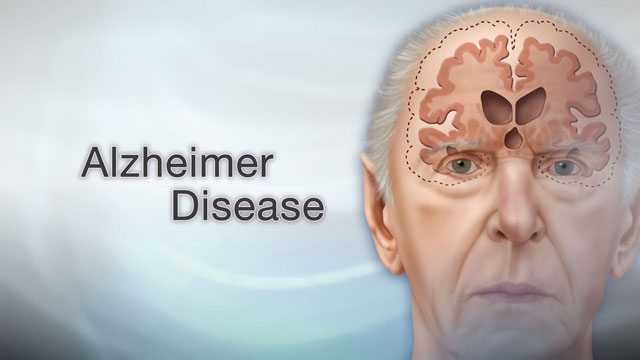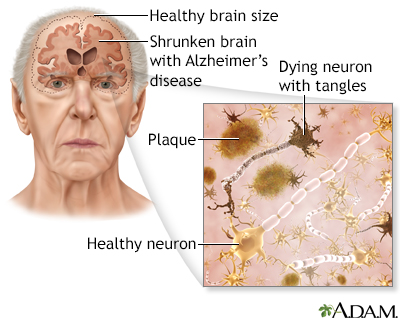Dementia - what to ask your doctor
You are caring for someone who has dementia. Below are questions you may want to ask their health care provider to help you take care of that person.
Dementia
Dementia is a loss of brain function that occurs with certain diseases. It affects one or more brain functions such as memory, thinking, language, j...

Questions
Are there ways that I can help someone remember things around the home?
How should I talk with someone who is losing or has lost their memory?
- What type of words should I use?
- What is the best way to ask them questions?
- What is the best way to give instructions to someone with memory loss?
How can I help someone with dressing? Are some clothes or shoes easier? Will an occupational therapist be able to teach us skills?
What is the best way to react when the person I am caring for becomes confused, hard to manage, or does not sleep well?
- What can I do to help the person calm down?
- Are there activities that are more likely to agitate them?
- Can I make changes around the home that will help keep the person calmer?
What should I do if the person I am caring for wanders around?
- How can I keep them safe when they do wander?
- Are there ways to keep them from leaving the home?
How can I keep the person I am caring for from hurting themselves around the house?
- What should I hide?
- Are there changes I should make in the bathroom or kitchen?
- Are they able to take their own medicines? How can I organize medicines to avoid mistakes?
What are the signs that driving is becoming unsafe?
- How often should this person have a driving evaluation?
- What are the ways I can lessen the need for driving?
- What are the steps to take if the person I am caring for refuses to stop driving?
What diet should I give this person?
- Are there hazards I should watch for while this person is eating?
- What should I do if this person starts to choke?
- Are there local Alzheimer (or dementia) support groups or other organizations which can provide help?
Reviewed By
Frank D. Brodkey, MD, FCCM, Associate Professor, Section of Pulmonary and Critical Care Medicine, University of Wisconsin School of Medicine and Public Health, Madison, WI. Also reviewed by David C. Dugdale, MD, Medical Director, Brenda Conaway, Editorial Director, and the A.D.A.M. Editorial team.
Budson AE, Solomon PR. Life adjustments for memory loss, Alzheimer's disease, and dementia. In: Budson AE, Solomon PR, eds. Memory Loss, Alzheimer's Disease, and Dementia: A Practical Guide for Clinicians. 3rd ed. Philadelphia, PA: Elsevier; 2022:chap 28.
Fazio S, Pace D, Maslow K, Zimmerman S, Kallmyer B. Alzheimer's Association dementia care practice recommendations. Gerontologist. 2018;58(Suppl_1):S1-S9. PMID: 29361074 pubmed.ncbi.nlm.nih.gov/29361074/.
US Department of Health & Human Services. National Institute on Aging website. Cognitive health: forgetfulness: knowing when to ask for help. order.nia.nih.gov/publication/forgetfulness-knowing-when-to-ask-for-help. Updated December 2020. Accessed November 7, 2024.


 All rights reserved.
All rights reserved.